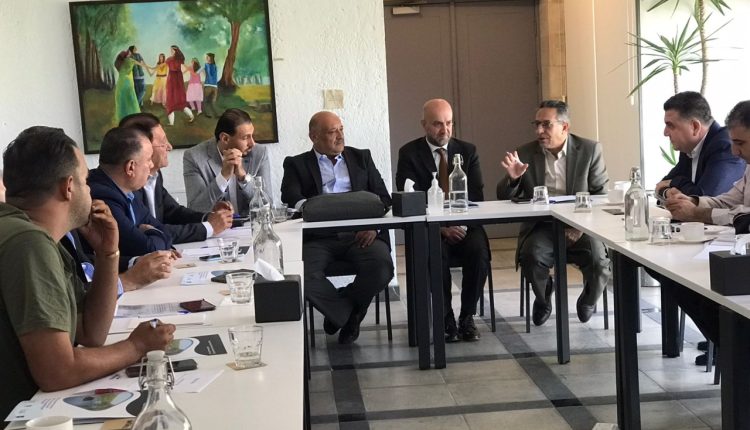الملكية لحماية الطبيعة” و”الأردنية” تنظمان جلسة تشاوريه حول حوض الأزرق
المرفأ..الأزرق – الجمعية الملكية لحماية الطبيعة
نظمت الجمعية الملكية لحماية الطبيعة بالشراكة مع الجامعة الأردنية مؤخراً، جلسة تشاوريه منفصلة لكل من المستخدمين وصناع القرار في منطقة حوض الأزرق المائي.
وهدفت الجلسة، إلى عرض نتائج الدراسات التحليلية لمنطقة حوض الأزرق المائي ضمن برنامج الشراكة في البحث والإبداع في منطقة البحر الأبيض المتوسط، (PRIMA) Partnership for Research and Innovation in the Mediterranean Area program.
وعملت الورشة بالإضافة إلى محاولة وضع مناهج جديدة للبحث والتطوير فيما يتعلق بتحسين توافر المياه والإنتاج الزراعي المستدام لحوض الأزرق المائي، على عرض أهم التحديات البيئية والمناخية التي تم مناقشتها مع المجتمع المحلي في المنطقة، ومن ثمّ إشراك صناع القرار في التوصيات التي نتجت عن جلسة المستخدمين.
وقال مدير عام الجمعية الملكية لحماية الطبيعة السيد فادي الناصر، نسعى دائماً إلى التركيز على هذا النوع من المشاريع العلمية والبحثية بسبب إيماننا بأن حماية الطبيعة والتنوع الحيوي جزء لا يتجزأ من حماية المجتمعات المحلية المحيطة بالمكان، بالإضافة إلى مساعدتها دائما في خلق فرص أفضل لاستدامة الحياة في منطقة محمية الأزرق المائية.
وأكد الناصر على ضرورة دمج مخرجات هذا النوع من الجلسات التشاورية ضمن استراتيجيات التنمية المستدامة التي تركز على ضمان حصول الجميع على المياه الصالحة للشرب وخدمات الصرف الصحي.
بدوره قال مدير محمية الأزرق المائية السيد حازم الحريشة، أن المنطقة تشهد تغيراً كبيرا ما بين بداية فترة الستينات التي شهدت حفر أول بئر في المنطقة، وتشجيع السكان على ممارسة مهنة الزراعة، وما بين مطلع القرن الحالي الذي يشهد فقداً كبيراً في المياه السطحية نتيجة ارتفاع درجات الحرارة التي تصل إلى 53 درجة مئوية في مناطق الظل أحيانا وتراجع إنتاج المحاصيل الرئيسية التي تشتهر بها المنطقة مثل الرمان والزيتون.
وأضاف الحريشة، أن التوصيات قد تساعد في ضمان استدامة المياه في المنطقة ومن أهم أن يتم دراسة المناطق الزراعية من قبل مهندسين متخصصين يساهمون في تقديم الاستشارات اللازمة للمزارعين في المنطقة، بالإضافة إلى تعزيز وتحديث البنية التحتية في المنطقة إذ أنها إلى الآن تعتمد على الحفر الامتصاصية ومياه الصرف الصحي والتي قد يكون لها أثر صحي سلبي على الحوض والمجتمع المحلي في المنطقة.
ويهدف المشروع الى تعزيز المعرفة حول آثار الأنشطة البشرية على الموارد المائية ضمن منطقة حوض الأزرق الجوفي عن طريق التشبيك بين السلطات المحلية وأصحاب العلاقة لدراسة الوضع الراهن للمنطقة وتقديم حلول ممكنة لتحقيق إدارة متكاملة ومستدامة لمنطقة الحوض.
ويأتي تنفيذ المشروع كاستجابة لحاجة الأردن التي فرضتها التحديات المائية الذي جعلت منه ثاني أفقر الدول عالمياً في المياه، وإضافة نوعية للبيانات اللازمة لتحليل الوضع المائي الراهن ومفتاحاً مهماً لمعرفة ماذا سيكون الوضع المائي خلال الأعوام القادمة، مما يساعد الجمعية الملكية لحماية الطبيعة على فهم طرق الإدارة الفعالة للمياه وتحقيق الحماية والاستدامة على المدى البعيد.
RSCN and the University of Jordan organize a consultative session on the Azraq Basin.
Azraq-RSCN
The Royal Society for the Conservation of Nature (RSCN), in partnership with the University of Jordan, recently organized a special consultation session for users and decision makers in the Azraq basin area.
The session aimed to present the results of the analytical studies of the Azraq basin area within the Partnership in Research and Innovation in the Mediterranean Area (PRIMA) program.
In addition to attempting to develop new approaches to research and development in relation to improving water availability and sustainable agricultural production in the Azraq Water Basin, the workshop presented the most important environmental and climatic challenges that were discussed with the local community in the region, and then involved decision makers in the recommendations that resulted from the users’ session.
“We constantly strive to engage with these kinds of scientific and research projects because of our belief that protecting nature and biodiversity is an integral part of protecting the surrounding communities, in addition to helping them always create better opportunities for sustaining life in Azraq Water Conservation Area”, the Director General of RSCN Mr. Fadi Al-Nasser said.
Al-Nasser stressed the necessity of integrating the outcomes of these kind of consultative sessions within sustainable development strategies that focus on ensuring universal access to safe drinking water and sanitation services.
In turn, the Manager of Azraq Water Reserve, Hazem Al-Harisha, noticed that there has been a significant change in the area between the early 1960s, when the first well was drilled and the populace was encouraged to practice agriculture, and the early 2000s, when there had been a significant loss of surface water due to high temperatures. The extreme heat, which occasionally exceeds 53 degrees Celsius in the shade, and the declining productivity of the region’s principal exports, like pomegranates and olives.
Al-Harisha added that the recommendations may help ensure the sustainability of water in the region, and it is important that the agricultural areas be studied by specialized engineers who can contribute to providing the necessary advice to farmers in the region, in addition to strengthening and modernizing the infrastructure in the region, as it has so far relied on cesspits and water. Sanitation, which may have a negative health impact on the basin and the local community in the area.
In order to study the current situation in the area and offer potential solutions to achieve integrated and sustainable management of the basin area, the project will network local authorities and stakeholders. This networking will increase knowledge about the effects of human activities on water resources within the Azraq Aquifer Basin area.
The project is being implemented in response to Jordan’s need for solutions to its water crisis, which has caused it to rank as the second-poorest country in the world in terms of water access. By adding qualitative data to analyze the current water situation and a crucial piece of information about what the future water situation will look like, the Royal Society for the Conservation of Nature can better understand management strategies and achieve protection and long-term sustainability.

